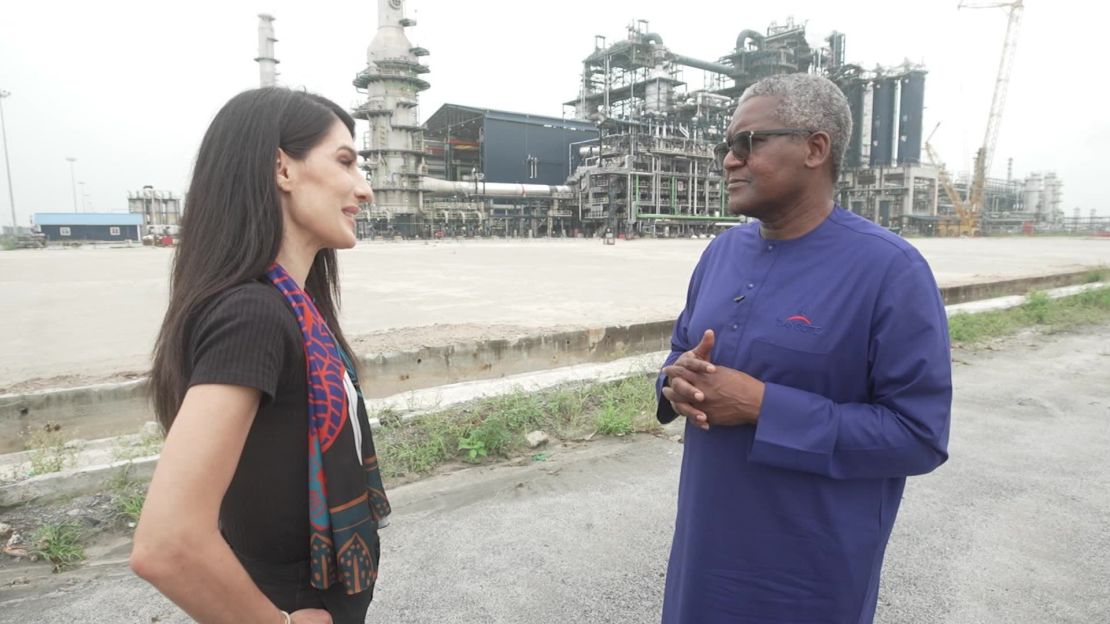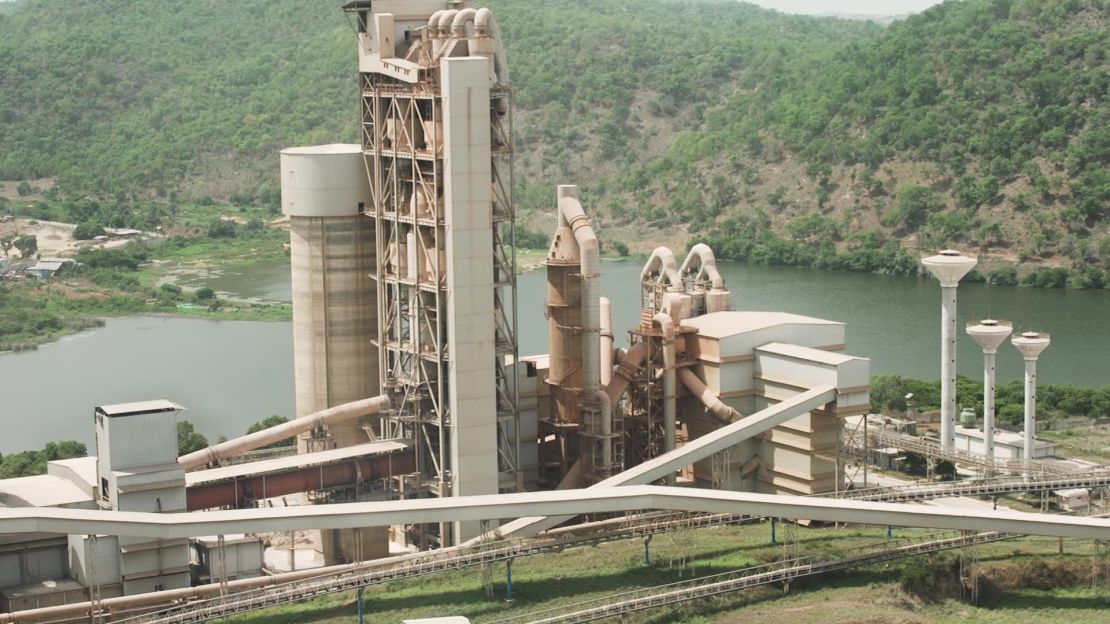CNN
—
Over the previous eight years, Aliko Dangote, Africa’s richest man, has constructed one of many world’s largest oil refineries. Spanning practically 4,000 soccer fields, development of the refinery started in 2016 on the Lekki Free Zone exterior of Lagos, Nigeria, and it opened in Might 2023. Dangote’s firm says the plant could have the aptitude to produce 650,000 barrels per day as soon as absolutely operational.
Nigeria is certainly one of Africa’s largest oil producers, but the nation has lacked the aptitude to refine its oil forcing it to depend on imported gas. With the opening of this refinery, Dangote Industries Ltd., a large conglomerate that additionally operates cement crops, a fertilizer plant, and sugar refinery, says it goals to course of sufficient oil to not solely make Nigeria self-sufficient however provide petrol, diesel, and jet gas to different African nations.
Now that the $19 billion facility is full, Dangote harassed it can take time for native oil producers to shift away from counting on abroad refineries, however it’s a problem he’s assured he can overcome: “I’ve been combating battles all my life, so I don’t get afraid of something,” he advised CNN.
In Might, CNN’s Eleni Giokos obtained an inside have a look at the refinery and spoke with Dangote about what it took to deliver this large venture to life and what impression it can have inside the continent.
The next interview has been edited for size and readability.
CNN: Do native oil corporations, oil producers need to promote crude to you?
Aliko Dangote: No person thought we have been going to seem on this business. So with that, we all know there are challenges and that’s the reality, I’ve to be very open to you, however NNPC, [Nigerian National Petroleum Corporation], they’ve been very useful. They do their very own bit, however among the IOCs [international oil companies] they’re struggling to present us crude as a result of everyone’s used to exporting and no person desires to cease exporting, which doesn’t make sense.

CNN: What’s the timeline of Nigeria being fully self-sufficient producing oil, refining oil regionally and exporting?
Dangote: Effectively, if the NNPC put all their refineries to work, Nigeria would be the largest petroleum merchandise export nation within the continent. Not solely within the continent – it’ll be one of many greatest (worldwide), not as a lot as India however virtually. So let me discuss Dangote Refinery: 40% of our refining merchandise will go exterior Nigeria. So that’s after assembly the whole demand of Nigeria. We’ll meet the demand 100%. By June or so, we must always be capable of absolutely meet Nigeria’s demand after which as a result of we’re ramping up already, we’re just a little bit over 420,000 barrels per day already. So, as we go alongside, ramping up, I imagine by July/August we needs to be at virtually 550,000 barrels per day. Then possibly earlier than finish of the 12 months we’ll be at about 650,000.
CNN: Along with constructing the oil refinery, you additionally constructed a cement manufacturing plant and have grow to be one of many largest cement producers in sub-Saharan Africa. Did it make financial sense on the time to construct a cement plant and compete successfully with imported cement costs?
Dangote: We didn’t have a lot problem as a result of we have been additionally the importers and there was large demand when it comes to cement. So, what we did was really to proceed with the buying and selling by constructing capability. After we began, our first plant was 5 million metric tons, and at the moment, the whole manufacturing in Nigeria was 2.1 million metric tons. However we went forward very aggressively – we invested our cash, we risked our capital, and we made the nation self-sufficient.

CNN: I’ve heard you discuss loads concerning the African Continental Free Commerce Space (AfCFTA) and whether or not it’s viable. You will have expertise doing cross-border commerce and even you’ve obtained points getting your cement throughout borders in sure components of the continent, so what’s occurring?
Dangote: The AfCFTA shall be very, very useful and when you’re occupied with profit, our firm will virtually be one of many high 5 when it comes to benefiting from the free commerce settlement. However I’ve not seen any enchancment [yet]. That’s the reality as a result of we have now 3 million tons of urea [a type of fertilizer] to export to African nations. It’s an excessive amount of for Nigeria’s consumption. Now we have petroleum initiatives to export. Now we have cement additionally to export. So what is sensible is to have the free commerce settlement work.
For us to cross that hurdle – as a result of the commerce between us [African countries] is just about 16%, which is simply too low – we have now to make it possible for all of the regional markets work. Now we have to take away necessities of visas. Now we have to permit free motion of individuals, free motion of products and providers, then the AfCFTA will work – with out that it’s virtually unimaginable. I imply, you have a look at it at this time, I’m going to Egypt tomorrow, however I want a visa. They’re saying that sure, okay, tremendous, they’ll give me visa on arrival if I’ve an American [passport]. I’ve an African passport, so that they’re discounting me being an African. So how can we commerce if you’re not permitting me into your personal nation?

A uncommon look inside Africa’s largest oil refinery
CNN: So how are imports affecting industrialization and native progress of worth chains?
Dangote: Effectively, it can really destroy the industrialization of Africa, if we proceed to import. The extra you import, you’re importing poverty into your continent and exporting jobs. As a result of wherever you’re importing from, you’re encouraging them to maintain increasing. After they broaden, they recruit extra folks, give extra jobs to their folks. However right here, the little jobs that we have to create, they destroy that. So, I’m not a giant fan of imports.
I’m a giant fan of industrialization and Africa could be industrialized, however we, Africans, are the one ones that may industrialize Africa. No person goes to return and do it for us. Now we have to have good insurance policies and the insurance policies must be constant, after which we have now to make it possible for the funding local weather is nice.











